|
| Review
of the Concert on 13th April 2024 by Andy Crane |
|
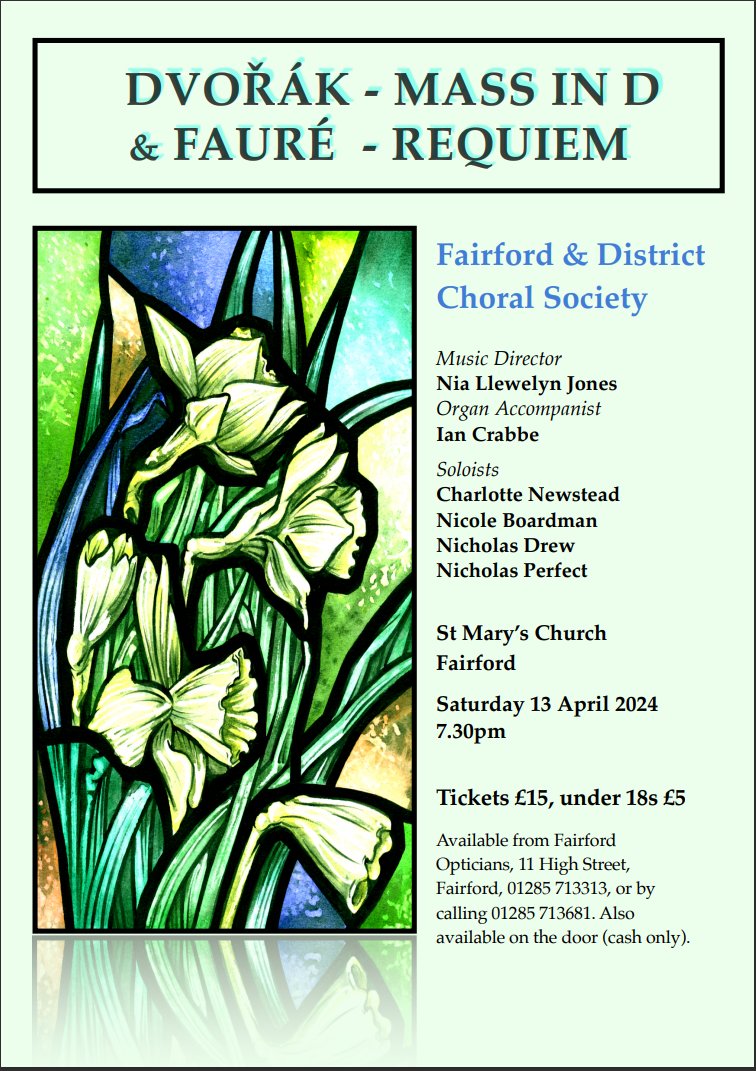
In keeping with the spring bursting
forth around us, Fairford & District Choral Society presented a
full house with a concert of ‘new beginnings’ in Fairford Church on
Saturday 13 April. Not only was this the first performance under the
baton of their new conductor, Nia Llewelyn Jones, but the two works
performed were also innovations in their day, each by a late nineteenth
century composer aiming to forge a new style in their music writing.
Faure’s Requiem, though very familiar to us today, was, in 1887, a very
bold departure from what had gone before - the result of his intention
simply to ‘write something different’. Similarly, Dvorak sought novelty
by bringing the spirit of Czech folk music into the Germanic late
Romantic tradition in his Mass in D from the same year.
The choir, though not large in number, showed itself equally capable of
making a big sound when needed and delivering the quietest of
reflective passages. The soprano section was particularly strong and
well-blended. In both works there was assiduous attention to dynamics
and throughout the singers responded well to their conductor’s positive
and expansive direction. Throughout, organ accompaniment was
sensitively provided by Ian Crabbe.
The variations in style and tempi in the Dvorak call for alertness and
agility, both of which were present in good measure. The delivery of
the warm and melodic Kyrie section made for an impressive start to the
concert. The tight control exhibited in the dramatic ‘Adoramus te’
fugue in the Gloria, was particularly pleasing as familiar motifs were
shared around the voice sections - a really punchy performance! The
quartet of soloists in Dvorak’s Mass largely play supporting roles, and
these were performed by soprano Charlotte Newstead, alto Nicole
Boardman, tenor Nicholas Drew and bass/baritone Nicholas Perfect.
After the interval, the choir, along with the soprano and baritone
soloists, gave an admirable performance of Fauré’s requiem. Pitching,
which can be challenging in this work, was good. The tenor voices, so
important in the exposed sections of the Introit and Agnus Dei, blended
well and had lost the occasional ‘over exuberance’ evident earlier in
the concert. The closing ‘In Paradisum’ was beautifully controlled and
sustained in a fitting end to this most enjoyable concert.
Congratulations to Nia and her singers. On this performance, they look
destined for a very bright future together.
Andy Crane, 14 April 2024
|
| Review
of the Concert on 2nd December 2023 by Colin Dowdeswell |
|
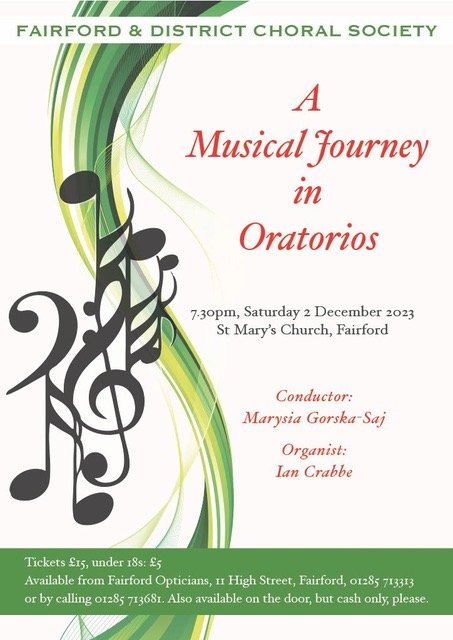
The Fairford and District Choral
Society concert took us on a journey
through oratorio excerpts through the ages.
With helpful and carefully researched introductions to each item read
by James Chute, the choir treated us to music, ranging from Vivaldi,
Bach and Handel to Mozart, Mendelssohn and Fauré. The contrasting
styles and moods made for a pleasingly varied programme, and the
choir’s enthusiasm transmitted itself to the audience, despite the
temperature in the Church.
The choir’s conductor, Marysia Gorska-Saj, in this her final concert,
did much to encourage the musical lines, and careful attention had been
paid to speeds and dynamics.
The choir was ably accompanied by organist Ian Crabbe, who contributed
further variety with solos by Bach and César Franck. The final item, a
spirited rendition of the Hallelujah chorus, brought the evening to a
rousing conclusion. The smiles told of a concert well received.
Colin Dowdeswell
|
| Review
of the Concert on 1st April 2023 by SC |
|
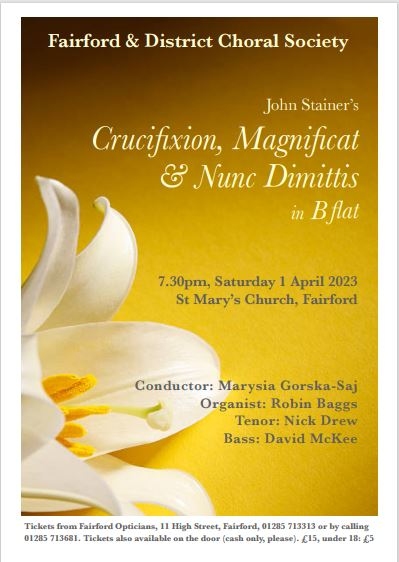
Fairford
& District Choral Society sang their Easter concert to a
near-capacity audience in the beautiful setting of St Mary’s
Parish Church, on Saturday evening, 1 April.
The
concert opened with Stainer’s Magnificat and Nunc Dimittis in B flat.
Marysia Gorska-Saj skilfully directed the choir, producing a range of
suitable dynamics and well-tuned singing.
The soloists David
McKee and Nicholas Drew each sang songs by Mendelssohn and Wolf
respectively. Both are professional singers and this was clearly
apparent in their performances.
The main piece in
the programme was Stainer’s Crucifixion, an excellent choice to mark
the start of Holy Week. Bass David McKee immediately
captivated
the audience with his opening solo, The Agony, and the well-disciplined
choir sang with clear diction and great feeling. The audience
joined the choir for the integral hymns and became a valuable part of
this uplifting performance. Nicholas Drew
(tenor
soloist) produced a spine tingling moment just before the final hymn
singing so very quietly, “And He bowed His head, and gave up the ghost.”
Bravo to organist Robin Baggs for superb accompaniment throughout.
SC
1 April 2023
|
| Review
of the Concert on 3rd December 2022 by Hilary Taylor |
|
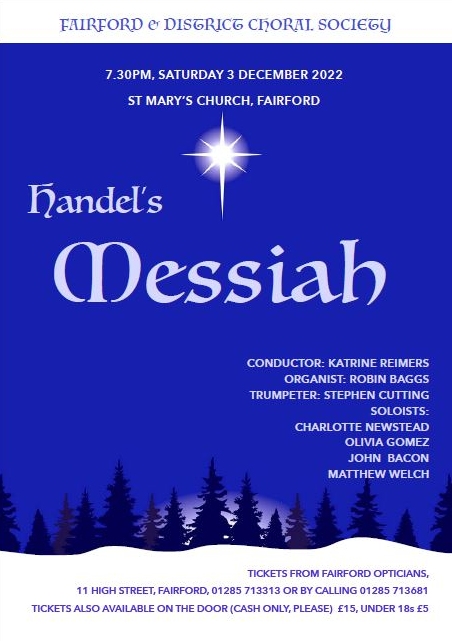 We
only usually associate the Messiah, Handel's Baroque oratorio with
Christmas, but it was originally written for Easter, and first staged
in Dublin in the New Music Hall, Fishamble Street at noon on April 13th
1742, doubtless to an audience as appreciative and spellbound as in St
Mary's Fairford 280 years later. What a lovely performance. From the
first notes of Tenor John Bacon's measured solo introduction, it was
obvious that we would be in for a treat. I often think that local
choral societies are seriously undervalued. It takes time and
dedication to produce a big choral work like Messiah and to be able to
see such a work in a local setting for such a reasonable price is
wonderful. Where better than in Fairford's beautiful parish
church? We
only usually associate the Messiah, Handel's Baroque oratorio with
Christmas, but it was originally written for Easter, and first staged
in Dublin in the New Music Hall, Fishamble Street at noon on April 13th
1742, doubtless to an audience as appreciative and spellbound as in St
Mary's Fairford 280 years later. What a lovely performance. From the
first notes of Tenor John Bacon's measured solo introduction, it was
obvious that we would be in for a treat. I often think that local
choral societies are seriously undervalued. It takes time and
dedication to produce a big choral work like Messiah and to be able to
see such a work in a local setting for such a reasonable price is
wonderful. Where better than in Fairford's beautiful parish
church?
The rippling polyphonic
lines-especially at
speed-in this tremendous work are pretty taxing to sing, but the
Fairford and District Choral Society under the direction of the
brilliant Katrine Reimers managed it splendidly. The choruses were
sensitively handled, with plenty of dynamic contrast and clarity of
diction. Some of the entries can be challenging, but the choir sang
them with confidence where I have sometimes heard groups
falter...
The
acoustics suited the fine voices of the four professional soloists.
They were engaging and commanded audience attention; the arias and
recitatives in this piece deserved no less and the quartet of Charlotte
Newstead-Soprano, Olivia Gomez-Contralto, John Bacon-Tenor and Bass
Matthew Clark-who stepped in at the last moment, thank you Matthew! did
full justice to Handel's masterpiece. Their solo performances were a
pleasure to hear and most moving.
This was storytelling
matched in expressive content and nuanced, sensitive delivery. How
lucky we were to have the opportunity to see such accomplished
performers in a local setting.
In the absence of an
orchestral ensemble the accompaniment was well balanced between the
heroic organist Robin Baggs, (I found myself wondering how many notes
he had to play); and a well chosen, unobtrusive keyboard accompaniment.
It was intriguing to see the keyboard played by Katrine while
simultaneously conducting. This was no mean feat. The splendid
insertion of Stephen Cutting's trumpet made a glittering, dramatic
addition to the whole. My neighbour at the concert described it as,
"Riveting."
I could go on about my favourite
passages, alas too difficult to
choose, but not to mention the Hallelujah Chorus would be churlish.
Totally uplifting, no wonder it is an all-time favourite-the entire
company of voices together in a universal expression of triumphant joy,
and why not?
Bravo Fairford and District Choral Society for a beautiful start to the
Christmas period. I haven't heard you before, but from now on I am a
fan!
Hilary Taylor
4 December 2022
|
|
Review of the Concert on 2nd April 2022 by TVJ |
|
 It is good to attend a pleasurable
concert by the Fairford and District Choral Society which took place on
2 April 2022 after the enforced pandemic break. As we move from a
difficult winter into Spring, I was struck by the sense of optimism
which infused the evening from the first note to the last. It is good to attend a pleasurable
concert by the Fairford and District Choral Society which took place on
2 April 2022 after the enforced pandemic break. As we move from a
difficult winter into Spring, I was struck by the sense of optimism
which infused the evening from the first note to the last.
Part 1 of the concert
was
devoted to works by Mozart, beginning with an
energetically executed performance of Mozart’s Overture in C, K399, ‘in
Baroque style’, by organist Robin Baggs, and culminating in the
composer’s ‘Mass in B flat’ K.275, a bright and joyful work featuring
SATB soloists juxtaposed with the choir. The diction and vocal
precision of both choir and soloists in this work under the direction
of conductor, Katrine Reimers, was
impressive, as it was throughout the concert.
The four professional
soloists, Charlotte Newstead (Soprano), Olivia Gomez (alto), John Bacon
(Tenor) and William Stevens (Bass) took us through a
range of solos and ensembles throughout the evening, beautifully
complimenting the choir and each displaying a wide range of vocal
tone-colour, admirable breath-management and soaring legato lines.
However, for me, the outstanding
performance
of the evening was the first item of Part 2, ‘Mendelssohn’s
‘Hear my Prayer’, so sensitively executed by the soprano
soloist and equally well delivered by the choir. I like Mendelssohn
sung with the discipline of Bach (whose works the 19c composer
championed), so that the romanticism in the music speaks for itself.
Charlotte’s sensitive, lyrical legato line and her subtly managed
dynamic nuances were here equally matched throughout by the choir,
resulting in romantic warmth coupled with ‘baroque’ precision. This
allowed the sensitivity, shape and drama of this lovely work to shine
through. Bravo!
The Mendelssohn led us to other short
romantic items and the programme concluded with Franz
Schubert’s ‘Magnificat in C’ featuring both choir and
soloists – a delightful end to an enjoyable evening.
TVJ
3 April 2022
|
| Review
of the Concert on 4th December 2021 by Janice V Thompson |
|
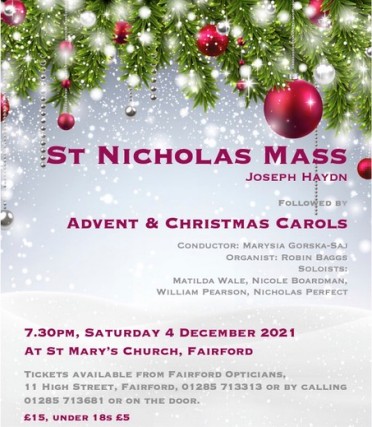 It was splendid to be part of an
appreciative audience at the Fairford and District Choral Society carol
concert on 4 December, and particularly so after a year’s gap due to
the pandemic. The evening was so warm and welcoming, despite the social
distancing and mask limitations to which we have now become so
strangely accustomed. In a well-chosen programme complete with
excellent soloists, the audience was treated to Haydn’s short St
Nicholas Mass followed by a delightful selection of Advent and
Christmas Carols. It was splendid to be part of an
appreciative audience at the Fairford and District Choral Society carol
concert on 4 December, and particularly so after a year’s gap due to
the pandemic. The evening was so warm and welcoming, despite the social
distancing and mask limitations to which we have now become so
strangely accustomed. In a well-chosen programme complete with
excellent soloists, the audience was treated to Haydn’s short St
Nicholas Mass followed by a delightful selection of Advent and
Christmas Carols.
Haydn is thought to have
composed the ‘Missa
Sancti Nicolai’ for the Feast of St Nicholas on the 6th
of December 1772 as a seasonal ‘thank you’ to his employer, Prince
Nickolaus Esterhazy. The Fairford choir, conducted by
music director Marysia Gorska-Saj, and uplifted by the
support of organist Robin Baggs,
delivered this whole lyrical work with a lightness of tone and diction
aptly suited to the festive occasion. The professional SATB quartet was
made up of conservatoire undergraduate Matilda Wale,
recent graduates Nicole Boardman and William Pearson, plus Gloucester
Cathedral Lay Clerk Nicholas Perfect. The ensemble
created an excellent blend of song and together with the choir,
highlighted the warm harmonies and lyrical legato lines of this
delightful, lilting ‘Mass in six-four time’.
After a short interval the choir
treated us to a balanced and enjoyable selection of
Advent and Christmas carols, each thoughtful and
reflective in nature. The carol choices gave us chance to enjoy the
unique voices of each of the soloists, soprano Matilda and tenor
William ably fronting Darke’s lovely ‘In the Bleak Midwinter’ and the
rich mezzo of Nicole in ‘A Maiden Most Gentle’.
Of all the carols performed I
most
enjoyed the choir’s rendition of ‘A Spotless Rose’ by Herbert Howells.
With a fine contrasting verse sung by bass soloist Nicholas, I thought
the choir here demonstrated not only a particular clarity of diction
and variety of dynamics, but also created a touching warmth of sound in
its middle range; a quality I had also glimpsed on several occasions in
the homophonic sections of Haydn’s Mass.
Following two lively John Rutter
arrangements the concert drew to a close with well-loved audience
carols. Despite the inevitable challenge which singing ‘Ding Dong
Merrily’ in a mask brings (!) it was altogether a welcome evening
reminding us of the true spirit of Christmas amidst these uncertain
times!
Janice V
Thompson
5 December 2021
|
| Review of the Concert on 7th December 2019 by
Janice V Thompson |
|
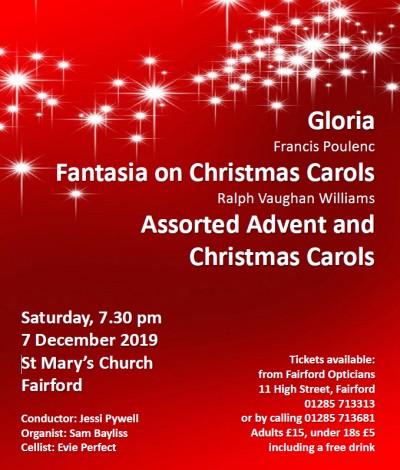 Fairford
and District Choral Society welcomed a full church to the
Christmas season on Saturday with a delightful concert featuring, Poulenc’s
‘Gloria’, Vaughan William’s ‘Fantasia on a Theme of Christmas Carols’
and other Advent and Christmas Carols. Fairford
and District Choral Society welcomed a full church to the
Christmas season on Saturday with a delightful concert featuring, Poulenc’s
‘Gloria’, Vaughan William’s ‘Fantasia on a Theme of Christmas Carols’
and other Advent and Christmas Carols.
The ‘Gloria’ was an apt
and
interesting choice as the central work of the evening. Originally
written for chorus, orchestra and soprano soloist, this Mass clearly
demonstrates Poulenc’s deep religious beliefs, his dramatic and
eclectic influences and also his sense of humour. The choir conveyed
the solemn words of the Mass with a lightness of tone and clarity of
diction, and the devout piety of the choral music was effectively
juxtaposed and commented on by the bright tonal colours produced by organist
Sam Bayliss. The music was in turns dignified, lyrical,
jazzy and playful and the warm tones of soprano Lucy
Mellors added serenity to the occasion. The final ‘Amen’
drifted ethereally towards heaven, a sincere achievement by the
assembled forces, ably led by guest conductor Jessi
Pywell.
After an interval with
wine the
audience experienced ‘surround sound’ as the choir moved into body of
the church, enfolding us in harmony and counterpoint in ‘Jesus Christ
the Apple Tree’. After four well-chosen carols, we moved into Vaughan
Williams ‘Fantasia on Christmas Carols’, ably led by Baritone
Jack Bowtell, who steered this folk-song inspired work
forward with precision and clarity of diction. It was good to also hear
the sonorous tones of young cellist and musician Evie
Perfect, adding to the majesty and mystery of the
opening bars of the work. Mystical and, at times, sumptuous, these
simple and direct folk-songs seem to arise from the mist of English
countryside, created by the subtle sounds of the choir, often singing
on pure vowels rather than words.
A most enjoyable evening,
well-balanced between choir and soloists, giving all present a real
flavour of Christmas.
Janice
V
Thompson
8 December 2019
|
| Review of the Concert on 11th May 2019 by Janice
V Thompson |
|
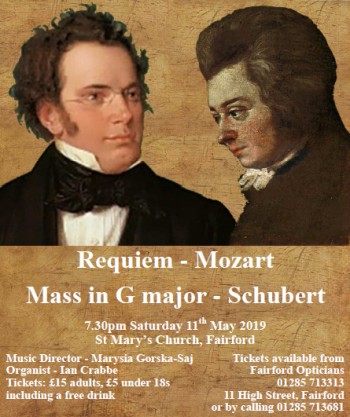 It
is always a joy to attend a choral concert on a summer evening and
Fairford Choral Society’s performance of Schubert’s Mass
No2 in G major and Mozart’s Requiem
was no exception. It
is always a joy to attend a choral concert on a summer evening and
Fairford Choral Society’s performance of Schubert’s Mass
No2 in G major and Mozart’s Requiem
was no exception.
The two works, ably
conducted by professional musician Marysia Gorska-Saj, neatly
complimented one another, and the well-balanced choir performed both
works with precision and musicality, demonstrating tonal warmth in the
Schubert and a wide range of vocal colour in the Mozart. The diction
was excellent throughout, and if there was the odd blemish of
intonation in the upper voices it was quickly corrected. I particularly
enjoyed the sixth movement of the Requiem, in which the choir
effectively moved back and forth between the lilting legato quality of
the initial weeping (lacrimosa), the terror of impending judgement
(judicandus homo reus) and the quiet plea for mercy (huis ergo parce).
Soprano
Lucy
Mellors soared effortlessly above the choir in the
Schubert Mass and blended effortlessly with her fellow professional
quartet members (alto Olivia Gomez, tenor William
Pearson, and baritone William Stevens) in the various
ensemble numbers.
Robin
Baggs,
who at short notice stepped in as organist for the occasion, proved an
excellent support to the choir throughout and added noticeable gravity
to the drama of the Requiem.
The Requiem closes
with
the promise of eternal light (Lux Aeterna). In fact I felt ‘light’ had
infused the singing at several points of the performance, even before I
had read the conductor’s biography.
Janice
V Thompson
May 11 2019
|
| Review of the Concert on 1st December 2018 by
Alice Gray |
|
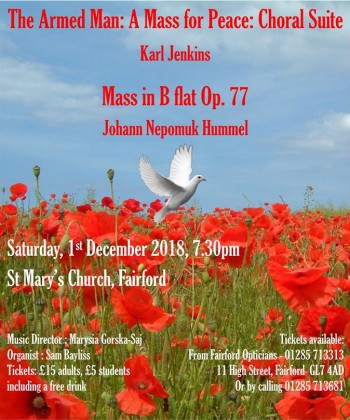 Fairford
and District Choral Society's December concert was held in the
beautifully atmospheric setting of the Grade I listed St Mary's Church,
Fairford. The first half comprised Hummel's Mass in B
flat Opus 77 where conductor Marysia
Gorska-Saj and the society took us on a musical journey
expertly accompanied by organist Sam Bayliss.
The exquisite blend of voices was at times both rousing and poignant,
while the upper parts were firmly supported by the tenor and bass lines. Fairford
and District Choral Society's December concert was held in the
beautifully atmospheric setting of the Grade I listed St Mary's Church,
Fairford. The first half comprised Hummel's Mass in B
flat Opus 77 where conductor Marysia
Gorska-Saj and the society took us on a musical journey
expertly accompanied by organist Sam Bayliss.
The exquisite blend of voices was at times both rousing and poignant,
while the upper parts were firmly supported by the tenor and bass lines.
After the interval Karl
Jenkins' The Armed Man: A Mass for Peace Choral Suite
was interspersed by heartfelt readings of poems from the First World
War in a fitting tribute to the Fallen 100 years on from the end of the
conflict. The lines from Urbs Dei - The City of God, and Dulce et
Decorum Est were especially moving.
All of the vocal
parts
came into their own in Jenkins' opening Kyrie, particularly the flowing
alto line. This was followed by the Sanctus where the Choral Society's
precise diction really led the change of mood in the music. Throughout
the suite the canon-style parts flowed around each other smoothly and
the performers' sensitivity to the dynamics, led by Marysia, was not
lost on the audience.
The sopranos
beautifully
led into the Agnus Dei and the work culminated in the finale God Shall
Wipe Away All Tears as a final act of Remembrance. Overall, the
performance was attuned to the musical sensitivities of the pieces and
it was pleasing to hear such a strong tenor section which balanced so
well with the other parts.
For those who missed
this
performance, the Society's next concert will be on 11th May 2019 where
they will perform Mozart's Requiem, K626 and Schubert's Mass No 2 in G
Major, D167, and I for one look forward to hearing them again in the
future.
Alice
Gray
|
| Review of the Concert on 21st April 2018 by
Ruth Foxman |
|
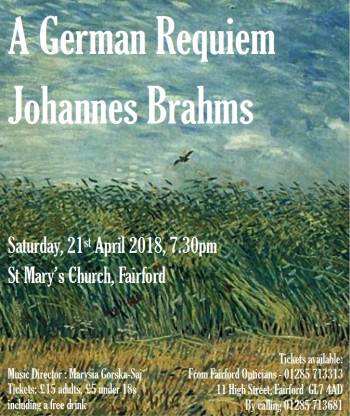 Fairford
& District Choral Society gave their spring concert on
Saturday in the historic setting of St Mary’s Church in Fairford. Fairford
& District Choral Society gave their spring concert on
Saturday in the historic setting of St Mary’s Church in Fairford.
The
first
half of the concert was a varied programme of vocal, piano and organ
music all thoughtfully introduced by the soloists. Emily
Griffiths (soprano) delighted the capacity audience with
her incredibly expressive voice and face, clearly portraying the
different characters of four Strauss songs she'd selected. Alison
Howell gave a faultless performance on the church organ
demonstrating a full width of colours.
Brahms’
German Requiem under the direction of Marysia Gorska-Saj
included soloists Emily Griffiths, and the
talented baritone William Stevens, accompanied on the
piano by Alison Howell and Jo Scullin.
The piano duet accompaniment was written by Brahms himself.
From
the
outset the choir performed as a single unit. No voices
stood out, no entries were missed, and I was particularly impressed how
calm and professional they were in sections where the piano
accompaniment went adrift. Marysia is a very physically
dynamic conductor, using her whole body to corral her
troops. The choir were able to bring a slightly altered tone and
attitude to each movement under her direction. The dynamic contrast the
choir achieved in the second movement was stunning. The first entry was
clear, with good diction, and beautifully sung, and the increase in
volume with no less of vocal quality at the refrain was striking. The
unscheduled accompaniment of lightning, thunder and rain only enhanced
the drama.
Both soloists had
wonderfully clear voices, and communicated well with the audience.
Brahms is not gentle
with
the choral parts, with basses and soloists alike pushed to their upper
reaches. This was only slightly evident in the very last movement where
the sopranos ceased to soar, and the effort to reach their top notes
was clear, but it was a thoughtful, sensitive and
thoroughly enjoyable concert. I'm very pleased I was
able to attend.
Ruth
Foxman
|
| Review of the Concert on 2nd December 2017 by
Joanna Kent |
|
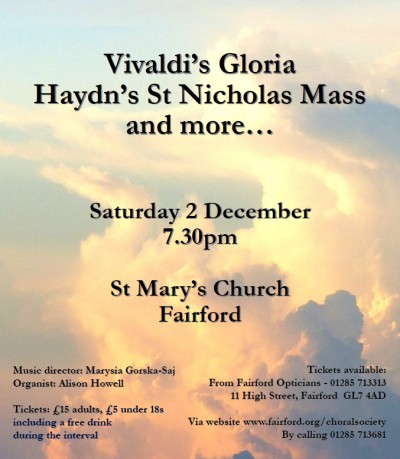 The lofty nave of St Mary's Church in
Fairford was filled with the voices of Fairford and District Choral
Society on the evening of Saturday 2nd December. The lofty nave of St Mary's Church in
Fairford was filled with the voices of Fairford and District Choral
Society on the evening of Saturday 2nd December.
Under the diligent
and enthusiastic musical direction of Marysia Gorska-Saj
the sixty strong choir gave the most moving performances of Vivaldi's
Gloria and Haydn's St. Nicolas Mass, accompanied by professional
organist Alison Howell. The choir were joined by four professional
soloists; Natasha Page, soprano; Olivia Gomez, alto; John Bacon, tenor
and Meilir Jones, bass.
The concert began
with a most
moving rendition of the St. Nicolas Mass by Joseph Haydn.
The choir voices blended in perfect harmony and the hours of rehearsals
were worth the effort. The clarity and diction should be noted,
especially in the Credo. The solo performances, along with the choir
resulted in a truly magnificent performance.
The programme then
moved
to several shorter pieces sung by the soloists, choir and an organ solo
played by Alison Howell.
The first was a beautiful rendition of 'A Slumber Song
of the Madonna' by Michael Head, sung by Olivia Gomez.
She gave an emotional performance and the last note was the longest of
the entire concert!
This was followed by an uplifting organ solo, 'In Dulci
Jubilo, BWV 729' by J.S. Bach. Alison Howell gave the
piece plenty of energy with Bach's use of major chords to fill the
church with the sounds of the organ in St. Mary's Church.
John Bacon
then sang the lovely calm and moving 'Domine, ego
credidi' from A Christmas Oratorio by C. Saint-Saens.
The singing of pieces from oratorios continued with Meilir
Jones singing 'Why do the nations' from the Messiah Oratorio.
The theme may not have been quite as seasonal as the previous pieces
but it was a great performance of a dramatic piece of music by G.F.
Handel.
The choir
joined
Natasha Page to sing the well known 'Ave Verum Corpus' by W. A. Mozart
written to celebrate the feast of Corpus Christi. The organ rippled
along under the soprano voice with the choir joining in the rhythmic
rippling.
The shorter pieces concluded with the choir singing
'Zion Hears the Watchmen's Voices' from Wachet auf, ruft uns die
Stimme, BWV 140 by J. S. Bach. This piece is such a
familiar piece that members of the audience were almost joining in. The
choir gave a great performance before a well deserved interval when
refreshments were enjoyed by the audience in an informal atmosphere in
the church.
The concert resumed
with a
roof lifting rendition of Antonio Vivaldi's Gloria.
Listening to the full performance by the choir with alto and soprano
soloists, Olivia Gomes and Natasha Page, was delightful. The music had
moments of contrast which the choir performed very well, under the
captivating direction of Marysia Gorska- Saj.
The relatively small
choir
of amateur singers, who join without an audition, demonstrated
tremendous passion and skill in their singing together. Marysia had
dedicated much rehearsal time to teaching choir members how to use
their entire body when singing, using Alexander Technique methods. The
tone, pitch, expression and diction, as well as the skill of singing
together as a team has shown in the resultant beauty of the
performance. The hard work of Robin Baggs who
accompanies the choir every week at their rehearsals
must be noted. He patiently supports Marysia and the singers in their
learning of how to give their best performance and is greatly
appreciated by all.
Congratulations
to everyone involved. It was a pleasure to be at St. Mary's for such a
joyous evening.
Joanna
Kent
|
| Review of the Concert on 13th May 2017 by Andrew
Wicker |
|
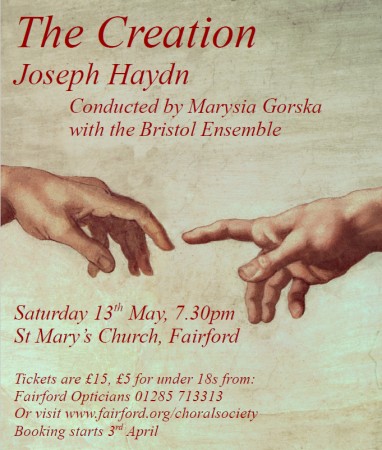 On Saturday 13th May, a
large and appreciative audience eschewed the Eurovision Song Contest in
favour of a much more sublime evening of music performed by the
Fairford and District Choral Society. The gathered throng filled St
Mary’s Church, Fairford for a performance of Haydn’s Creation featuring
not only the choral society but a small orchestra and three vocal
soloists. On Saturday 13th May, a
large and appreciative audience eschewed the Eurovision Song Contest in
favour of a much more sublime evening of music performed by the
Fairford and District Choral Society. The gathered throng filled St
Mary’s Church, Fairford for a performance of Haydn’s Creation featuring
not only the choral society but a small orchestra and three vocal
soloists.
"The
Creation" by Joseph Haydn is one of the great oratorios
in the classical music canon and rightly features regularly in the
repertoire in many of the country’s choral societies. Taking
inspiration from the Biblical account of the creation of the world, the
oratorio, over three parts, presents the creation of the heavens and
earth; the creation of living creatures; and the joy of Adam and Eve in
exploring the creation. Although a fairly well-known work, it presents
challenges for both the choir and soloists.
The three soloists
were
each featured extensively throughout. The Baritone,
Owain Browne, provided a warm and authoritative
performance throughout demonstrating why he has been featured at the
BBC Proms. The Soprano, Charlotte Newstead,
particularly excelled in ‘On Mighty Pens’ bringing to life the
different birds featured in this aria with ease. A special mention must
be made of the Tenor, James Edgeler.
Drafted in only on the morning of the concert due to the indisposition
of the booked soloist, this nineteen year-old choral scholar of
Gloucester Cathedral sang with confidence throughout. James’s
performance of the aria ‘In native worth and honour clad’ had a lovely
sense of shaping to the phrases showing great potential in this young
voice.
The
standard
achieved by the choral society was equally impressive.
The intonation of the choir was especially well-maintained during the
whole work; not an easy achievement in a non-auditioning, amateur
choir. The balance between the four parts was sustained during the
performance with the sopranos working hard in the face of a more
numerous alto section! The choir demonstrated great dynamic contrasts
and clear diction throughout. Good balance was also achieved between
choir and orchestra with the Bristol Ensemble delivering
an assured accompaniment.
The performance was
held
together remarkably well by the conductor Marysia Gorska.
The chorus, ‘Awake the Harp’ with its vivace tempo marking and
complicated contrapuntal texture can have a tendency to race away but
was in this performance kept well-controlled. As an audience member,
albeit one with experience of conducting and performing with choirs, it
was obvious through her conducting of the choir, that Marysia has
trained the choir in technique as well as teaching them the music.
Overall the
performance
did true justice to Haydn’s wonderful and uplifting music leaving this
audience member pleased to have attended.
Andrew
Wicker
|
| Review of the Concert on 4th December 2016 by
Bernard Crooks |
|
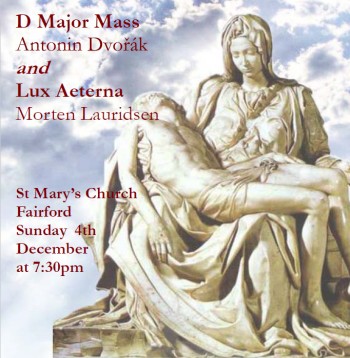 This
concert featured two choral works having their first performances
just over 100 years apart — Dvorak’s Mass in D
in 1893, and Lauridsen’s Lux aeterna in
1997. Each piece brought challenges to the Society, which were tackled
with enthusiasm by the singers, led with remarkable skill by their conductor,
Marysia Gorska. This
concert featured two choral works having their first performances
just over 100 years apart — Dvorak’s Mass in D
in 1893, and Lauridsen’s Lux aeterna in
1997. Each piece brought challenges to the Society, which were tackled
with enthusiasm by the singers, led with remarkable skill by their conductor,
Marysia Gorska.
The pieces were
hugely
different, being written in different centuries, in different styles
and originating in different countries, but similar in their spiritual
background, with Dvorak’s inspiration having roots in the liturgy of
the Catholic Mass and Lauridsen responding to his mother’s death whilst
also drawing on a range of religious texts: in his own words he was
immersed in “timeless and wondrous words” about light eternal (lux
aeterna). It was Lux aeterna that concluded this inspiring programme,
with each section of the choir giving moments of beauty and warmth,
with dramatic contrasts of volume and well controlled, hardly audible,
pianissimo phrases. (Congratulations to those who managed the final
bass low D !)
The soloists in
Dvorak’s
Mass were not always comfortable in synchronising with the choir but
there were some magical melodic passages, as in ‘Credo in Unum Deum’,
where Olivia Gomez, mezzo soprano and the
chorus sang together expressively and in true ‘harmony’. The soloists
each sang songs between the main works, and this included a surprise
item from Meilir Jones — a Welsh
rendition of ‘David of the White Rock’, demonstrating both his delicate
and forceful bass tones.
Organ accompaniment
was
provided by Robin Baggs, making good use
of the range of stops on the newly restored organ in St. Mary’s Church.
The evening
concluded with
a special presentation to John Read, the
choir’s founder, recognising ten years of tireless dedication in
developing one of the county’s exciting choirs. John’s musical talent,
as singer, conductor and composer has been a great inspiration to the
town’s Choral Society and has included a performance in 2014 of his own
Pilgrim Mass, composed as part of his studies with the Open College of
the Arts.
The Fairford Choral
Society’s next concert will be on 13th May 2017, when they will perform
Haydn’s ‘Creation’.
Bernard
Crooks
|
| Review of the Concert on 1st May 2016 by
Bernard Crooks |
|
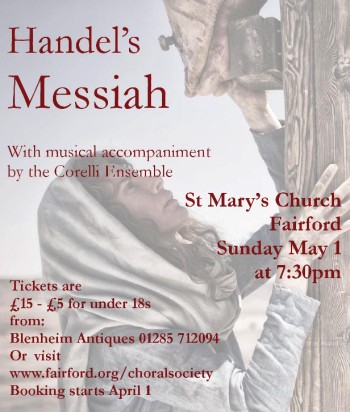 There was an atmosphere of
excited expectation at the start of this concert, not only because it
was to feature the magnificent oratorio ‘Messiah’
but because it was to be the Choral Society’s first performance under
the direction of Marysia Gorska, their vivacious new
conductor. There was an atmosphere of
excited expectation at the start of this concert, not only because it
was to feature the magnificent oratorio ‘Messiah’
but because it was to be the Choral Society’s first performance under
the direction of Marysia Gorska, their vivacious new
conductor.
The programme notes
reminded us of the Faulkner’s Dublin Journal report following Messiah’s
premiere on 13th April 1742, which described the music as “ the
sublime, the grand and the tender.” By the end of this performance,
there was no doubt that we had experienced each of these, delivered
with energy, delicacy and a dramatic interpretation by conductor and
performers.
The
choir
sang with enthusiasm, responding to clear direction from
their conductor. Highlights were the lightness of fast semi-quaver
passages, crisp diction and strong singing, as in ‘Glory to God, good
will towards men.’ Contrasts of volume and intensity brought the story
to life as the choir made the most of the text with feeling and
emotion. In ‘He trusted in God’, all parts contributed to the sense of
drama in a well paced passage and the use of a semi-chorus (‘Lift up
your heads’) heightened the question and answer conversation, with
increasing layers of sound culminating in a forte full choir
proclaiming ‘He is the King of Glory’.
Warwick
Cole
led the Corelli Ensemble which efficiently accompanied
the singing. The placing of players to one side of the chorus did not
prevent a good rapport between them, and the Ensemble was particularly
sensitive in the more poignant moments of the work; they provided
powerful support in the moments of drama, in particular when a solo
trumpet joined the bass soloist in ‘The trumpet shall sound’.
Four soloists
provided the
Recitatives and Airs between choruses, responding well to the range of
moods required in Handel’s writing. The stunning performance by Martin
Le Poidevin, bass, demonstrated not just the power of
his voice but also the superb skill in holding our attention: we
believed that he was speaking to each of us with his descriptions of
‘darkness’, ‘rage’ and ‘mystery’.
Alison
Bell,
alto, met the challenge of the florid ‘Refiner’s fire’ and delivered
‘He was despised’ with delightful interplay alongside the accompanying
strings. Charlotte Newstead sang the
soprano Airs with agility and joined with Alison in a duet in which
parts were well matched and sung with feeling and confidence.The
concert began with tenor, John Bacon,
singing with sensitivity and calmness in ‘Comfort ye’, speaking the
words that anticipated the coming of the Messiah.
The combined forces,
led
so capably by the conductor, should be congratulated on a memorable
evening. We wait with eager anticipation for the Society’s next concert!
Bernard
Crooks
|
| Review of the Concert on 28th November 2015
by Andrew Crane |
|
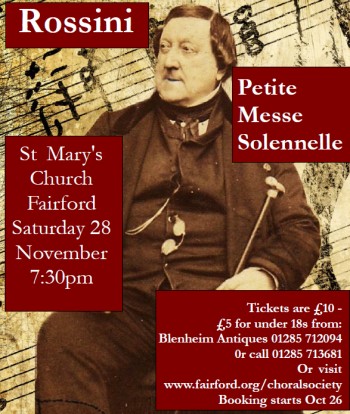 Fairford
& District Choral Society performed on Saturday for the last
time under the baton of their founding musical director,
John Read. The work chosen for this farewell concert – Rossini’s
Petite Messe Solennelle – embodies a wide variety of
styles and provided an opportunity to show how much has been achieved
by a choral society with only modest financial resources but with a
great will to succeed and a strong local following. Fairford
& District Choral Society performed on Saturday for the last
time under the baton of their founding musical director,
John Read. The work chosen for this farewell concert – Rossini’s
Petite Messe Solennelle – embodies a wide variety of
styles and provided an opportunity to show how much has been achieved
by a choral society with only modest financial resources but with a
great will to succeed and a strong local following.
Rossini’s mass was
first
performed in 1864, late in a musical life made famous by operatic
masterpieces including The Barber of Seville and William Tell. Despite
its liturgical basis, Rossini was not able, and probably never
intended, to disguise the operatic pedigree of this substantial work.
The accompaniment is unusually scored for piano and harmonium and was
expertly delivered by Robin Baggs and Jonathan Hope.
Soprano
Charlotte Newstead, mezzo Alison Bell and bass Martin Le Poidevin,
all previous performers at Fairford, were joined by tenor
John Bacon. Although in the Gratias trio the blend was
not entirely successful, the solo, duet and quartet movements were well
executed, particularly enjoyable being the tenor Domine Deus, the most
overtly operatic and melodic aria, and the bass Quoniam.
Rossini presents
many
challenges for the chorus, not least cohesion in the extended fugues -
Cum sancto spiritu and Et vitam venturi saeculi. Both, however, were
accurately delivered in a convincing and spirited fashion at a very
satisfying tempo. Such was their success that any tonal imprecision in
the highly chromatic opening Kyrie was easily forgiven by the
appreciative capacity audience.
John paid tribute to
all
those who had worked with him to support the Society since its
inception. He wished his successor Marysia Gorska
every success and encouraged all to return for her first concert,
Messiah, on 1st May, before leaving the rostrum for the final time,
amid loud and sustained applause.
Andrew
Crane
|
| Review of the Concert on 15th March 2015 by
Penny Pitt |
|
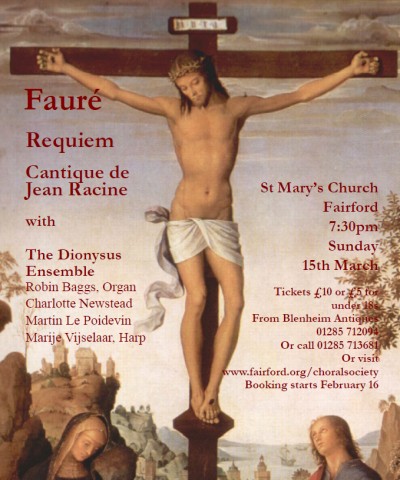 The Fairford and District
Choral Society’s latest outstanding concert was dominated by an
exciting range of French music. It opened with Fauré’s
prize-winning early work Cantique de Jean Racine, thoughtfully
conducted by John Read. The choir, accompanied by the Dionysus
String Ensemble who set the tone with their beautiful
sonorities in the opening section, sang sensitively, capturing the
beauty of this prayer for God’s grace through their focused
interpretation. The Fairford and District
Choral Society’s latest outstanding concert was dominated by an
exciting range of French music. It opened with Fauré’s
prize-winning early work Cantique de Jean Racine, thoughtfully
conducted by John Read. The choir, accompanied by the Dionysus
String Ensemble who set the tone with their beautiful
sonorities in the opening section, sang sensitively, capturing the
beauty of this prayer for God’s grace through their focused
interpretation.
This was followed by
a dazzling
virtuoso performance by Marije Vijselaar, a Dutch harpist
and member of the FADCS, of another Fauré piece, his Impromptu
for Harp in D Flat Major. The audience were visibly
thrilled to hear such technical brilliance combined with an ability to
convey the emotional nuances of the music. The Dionysius Ensemble then
gave us the one non-French work of the evening: Mendelssohn’s
String Symphony No 3 in E minor. This little heard piece
proved an excellent choice for this talented group of musicians.
Before the interval,
we
were treated to some very well-known and beautiful solos and duets by
Gounod and Franck. Charlotte Newstead (soprano) was
accompanied on the harp in Gounod’s Ave Maria. Her
wonderful breath control, particularly apparent in the final phrases,
allowed for an invigoratingly fresh interpretation of this well known
piece. Equally beautifully judged was Martin Le
Poidevin’s O Salutaris, another much-loved Gounod song,
accompanied by the highly gifted organist Robin Baggs.
The second part of
the
concert was devoted to Fauré’s Requiem,
combining the talents of the choir, organist, string ensemble and
soloists. The choir rose to the challenge of this exquisite work, with
the dynamic contrasts brilliantly drawn out under John Read’s expert
direction. The soloists were again outstanding, with a genuinely moving
Pie Jesu and a chilling Libera Me. This wonderfully thought through
concert programme was extremely well received by the capacity audience,
a testament to the quality of performance that we have come to expect
from F&DCS.
Penny
Pitt
Fairford
|
| Review of the Concert on 15th November 2014 by
Andrew Crane |
|
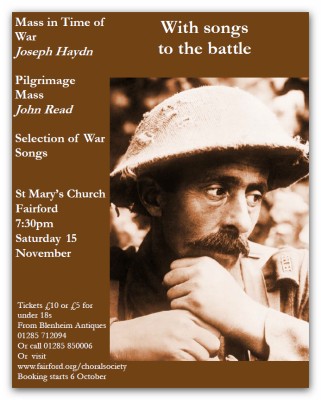 Choral
director John Read set his singers a demanding, but
appropriate, test for the Fairford & District Choral Society’s
WWI commemoration concert ‘With Songs to the Battle’ on 15 November.
The programme notably included the première of John’s Missa
Sancti Jacobi – A Pilgrim Mass, set for chorus and
soloists. The work was inspired by a pilgrimage John took to Santiago
de Compostela a decade ago and includes references to his musical
experiences on the journey. John recognised the fact that the lives of
a soldier and a pilgrim have one thing in common - both involve a lot
of walking. The mass, though, is far from pedestrian in its composition
and the choir were kept on their toes with complex rhythms, frequent
changes of tempi and dynamics and testing intonations. One or two
rather tentative entries did nothing to spoil an impressive performance
in which the differing moods of the movements were well conveyed,
including a fine crescendo to the fortissimo
conclusion of the Gloria and a sensitive rendition
of the beautifully melodic writing in the Gradual and Alleluia.
This is certainly a work that must be heard again. Choral
director John Read set his singers a demanding, but
appropriate, test for the Fairford & District Choral Society’s
WWI commemoration concert ‘With Songs to the Battle’ on 15 November.
The programme notably included the première of John’s Missa
Sancti Jacobi – A Pilgrim Mass, set for chorus and
soloists. The work was inspired by a pilgrimage John took to Santiago
de Compostela a decade ago and includes references to his musical
experiences on the journey. John recognised the fact that the lives of
a soldier and a pilgrim have one thing in common - both involve a lot
of walking. The mass, though, is far from pedestrian in its composition
and the choir were kept on their toes with complex rhythms, frequent
changes of tempi and dynamics and testing intonations. One or two
rather tentative entries did nothing to spoil an impressive performance
in which the differing moods of the movements were well conveyed,
including a fine crescendo to the fortissimo
conclusion of the Gloria and a sensitive rendition
of the beautifully melodic writing in the Gradual and Alleluia.
This is certainly a work that must be heard again.
The changing moods
in
Haydn’s Mass in time of War also make
considerable demands on the chorus, but they responded well to the
conductor’s direction and maintained a good forward movement
throughout. The quartet of soloists – Charlotte Newstead
(soprano), Alison Bell (mezzo), Christopher Palmer (tenor) and Martin
Le Poidevin – delivered a beautifully balanced blend and
Martin was particularly impressive in the Qui tollis peccata
mundi section of the Gloria. The most
direct allusion to war comes in the Agnus Dei,
where drum rolls on the timpani (played by Paul Berrow)
and the muted ensemble of the chorus created perfectly the composer’s
intended sense of foreboding.
The evening ended
with Songs
of World War I in which the audience were invited to
join in the choruses. After Adam Bayliss’s trumpet
rendition of the last post and John
Herrington’s reciting of the Ode of Remembrance,
narrator Oliver Ashford-Smith introduced
selected songs from the time of call-up at the start of the war to the
weariness and longing for peace towards the end. The soloists showed
their talent for song (as well as liturgy) and Robin
Baggs gave a masterly and sensitive accompaniment on
both organ and piano. The evening concluded with all in St Mary’s
Fairford joining to sing Elgar’s Land of Hope and Glory.
Andrew
Crane
Coates, 16.11.2014
|
| Review of the Concert on 10th May 2014
|
|
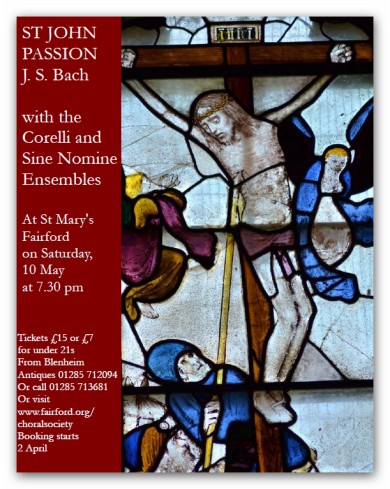 On Saturday 10 May The
Fairford and District Choral Society gave its most ambitious concert
yet, performing J S Bach's St John Passion.
This musically dramatic re-telling of the betrayal, trial and death of
Jesus is widely acknowledged to be one of the greatest pieces of
Western music written and is a challenging task for the soloists, the
orchestra and the choir alike. On Saturday 10 May The
Fairford and District Choral Society gave its most ambitious concert
yet, performing J S Bach's St John Passion.
This musically dramatic re-telling of the betrayal, trial and death of
Jesus is widely acknowledged to be one of the greatest pieces of
Western music written and is a challenging task for the soloists, the
orchestra and the choir alike.
All three rose to
this
challenge. The soloists from the Ensemble Sine Nomine
gave a moving account of the gospel story with the tenor Nicholas Drew
giving a fine performance of the very demanding role of Evangelist.
They were accompanied by the Corelli Ensemble
under the direction of Warwick Cole and their playing was particularly
noteworthy for the sensitive accompaniment of the recitatives. The
choir under the direction of John Read gave a confident and dramatic
account of the choruses with their difficult entries and complex
polyphony with only minor lapses but were able to also sing the
reflective chorales with understanding and feeling, rising gloriously
to the last hope-filled chorale and their by then well-earned place in
"Abraham's bosom".
The Choral Society's
next
concert is on 15 November in St Mary's Fairford and will include
Haydn's Mass in Time of War, the premier of John Read's Pilgrim Mass
and songs from the First World war.
Keith
Salway
|
|
Review
of the Concert on 1st December 2013
|
|
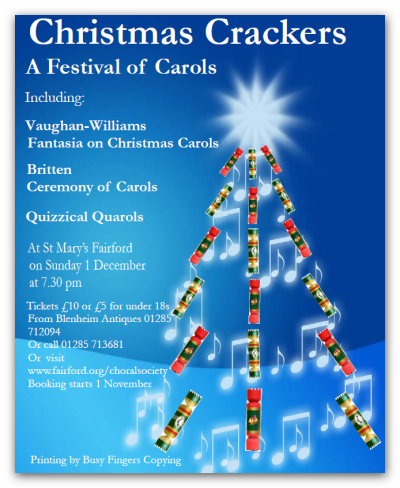 An enthusiastic
audience came along to Fairford and District Choral Society’s Christmas
Crackers concert in St Mary’s Church on Advent Sunday evening. An enthusiastic
audience came along to Fairford and District Choral Society’s Christmas
Crackers concert in St Mary’s Church on Advent Sunday evening.
“…the
choir held
its own and dealt especially well with the repeated staggered entries
in This Little Babe. The solo movements, sung by soprano and
mezzo-soprano Grace Carter and Louise Viner, provided a lovely
contrast…”
Andy Crane – Chairman of Cirencester Choral Society.
Vaughan Williams’
Fantasia
on Christmas Carols was accompanied on organ by Robin Baggs with Henry
Herford the baritone soloist.
Andy says “…
the
sopranos gave a very good account of themselves with a succession of
top As in Come all you worthy gentlemen. The soloist sang with
appropriate verve…”
The novelty in the
Christmas Cracker was the beautifully executed Aria in classic style
for harp and organ by Marcel Grandjany.
Six improvisations
by
Organist Robin Baggs provided a spot-the-carol quiz in the second half.
Conductor John Read, in festive mood, led the audience in Advent hymns
before sending them on their way.
Below: The Harpist,
Ruth
Kenyon and Bass, Henry Herford.
|
| Review of the Concert on 13th April 2013 by
Penny Pitt |
|
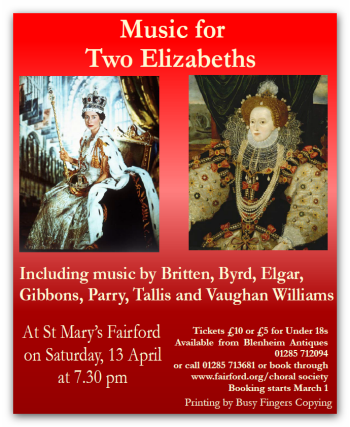 ‘Music for Two
Elizabeth’s’ was the intriguing name given to a wonderful
evening of music making by the Fairford and District Choral Society
on Saturday, April 13th. The resulting programme guided the audience on
a musical journey encompassing choral pieces from the times of
Elizabeth I to the more recent times of our present monarch, Elizabeth
II. ‘Music for Two
Elizabeth’s’ was the intriguing name given to a wonderful
evening of music making by the Fairford and District Choral Society
on Saturday, April 13th. The resulting programme guided the audience on
a musical journey encompassing choral pieces from the times of
Elizabeth I to the more recent times of our present monarch, Elizabeth
II.
The first piece, ‘Sing
Joyfully’ by Tudor composer William Byrd, set a high
standard for the evening’s performance. An unforced soprano tone at the
opening perfectly matched the demands of Byrd’s choral music style.
Close following of the conductor, John Read,
allowed for a convincing and engaging interpretation, particularly
noticeable in the final section. Works by Orlando
Gibbons (1583-1625) and Thomas Tallis (1505-1585)
completed the early music section of the concert which included an absolutely
breathtaking performance of Gibbon’s organ work ‘The Queen’s Command’
by the organist for this concert Robin Baggs. This was
the first of three solo organ pieces which he performed immaculately
and with great subtlety; members of the choral society rightly consider
themselves fortunate to have such a gifted regular accompanist.
Works by Benjamin
Britten, Holst, Finzi, Vaughan-Williams, Parry and Elgar,
gave us a real sense of the flowering of English choral music from the
later part of the nineteenth century onwards. Here the Choral Society
was able to show how it is able to tackle a wide range of musical
styles with real confidence and evident enjoyment. There were many
highlights including a very early work by Britten ‘Hymn
to the Virgin’ (1930) which called for two choirs
singing in English and Latin. Both groups here achieved a contemplative
style and sang with great discipline producing a moving account of this
work.
The choral society
was
joined for this performance by two talented young
singers, Charlotte and Georgia Hall who sang solo parts
in Britten’s Te Deum and Vaughan-Williams ‘O Taste and
See’. The tuning and pure tone they achieved was a sheer
delight, rightly acknowledged by the enthusiastic audience at this
well-attended musical offering.
Penny
Pitt
|
| Review of the Concert on 10th November 2012 by
Penny Pitt |
|
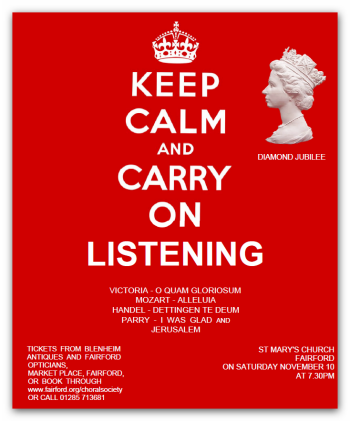 The exciting and
varied concert given by Fairford and District Choral Society on
Saturday 10th November was a musical treasure not to be missed. The
carefully balanced programme contained many musical delights and this
performance proved, once again, that the choral tradition for which
this area is so renowned is still very much alive. The exciting and
varied concert given by Fairford and District Choral Society on
Saturday 10th November was a musical treasure not to be missed. The
carefully balanced programme contained many musical delights and this
performance proved, once again, that the choral tradition for which
this area is so renowned is still very much alive.
The choir were
wonderfully
supported on this occasion by the addition of five highly talented
professional singers - Charlotte Newstead, Janet Upton,
Alison Bell, Alexei Winter and Martin Le Poidevin - who
set the tone at the start of the concert with their delicately phrased
and truly moving rendition of ‘O Quam Gloriosum’.
This motet for All Saints’ Day, by the Spanish composer Tomas Luis de
Victoria, is a superb example of his vivid, impassioned style. The
choir followed with a full toned and highly persuasive account of Parry’s
famous celebratory introit ‘I Was Glad’.
There were many
special
moments of the evening including a stunning performance
by soprano Charlotte Newstead of the brilliant and technically
demanding ‘Exsulate Jubilate’, the sensitive and
flawless organ playing by the accompanist Robin Baggs
(a treat in itself) and the emotional range achieved by both choir and
soloists in the Handel ‘Dettingen Te Deum’.
The touching singing by the soloists in this work and the attention to
dynamics and word-painting by the choir clearly impressed and moved the
capacity audience.
This ambitious,
non-auditioning choir are trained and ably conducted by John
Read who has done so much to inspire and encourage music
lovers of the Fairford area. This performance shows yet again that live
music–making continues to play an integral part in the life of the
market town and neighbouring villages.
Penny
Pitt
|
| Review
of the Concert on 31st March 2012 by Raymond Fenton |
|
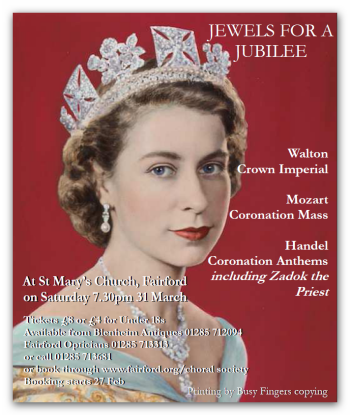 We were treated to a most
adventurous programme. Perhaps some of their most difficult works since
they were founded in 2006. The concert was entitled Jewels for a
Jubilee and so to celebrate her Majesty’s diamond jubilee we all stood
up to sing two verses of the National Anthem. We were treated to a most
adventurous programme. Perhaps some of their most difficult works since
they were founded in 2006. The concert was entitled Jewels for a
Jubilee and so to celebrate her Majesty’s diamond jubilee we all stood
up to sing two verses of the National Anthem.
The concert then
started
by Robin Baggs playing on the organ William Walton’s march, Crown
Imperial with great precision. Joined by the four excellent soloists
Fiona Dobie, Soprano, Natanya Phillips, Mezzo, Peter Harris, Tenor and
Henry Herford, Bass, the choir performed Mozart’s Coronation Mass in C.
There was some excellent singing during the Credo. The Sanctus starts
slow, is difficult and has sustained high notes for the sopranos which
then leads into the magnificent Hosanna in Excelsis which the choir
obviously enjoyed singing.
After a short
interval
the choir returned to sing all four of the Handel Coronation Anthems.
The first one, Let Thy Hand be Strengthened ends with a stirring chorus
of Alleluia. The second anthem, The King shall Rejoice has a very
difficult third movement which they tackled well, but as to be expected
was a little untidy in places. The third anthem, My Heart is Inditing
was sung with confidence though voices were beginning to get a little
tired. Then finally the last anthem is the well known Zadok the Priest
which formed an excellent ending to a most enjoyable concert.
Raymond
Fenton
|
| Review
of the Concert on 12th November 2011 by Raymond Fenton |
|
The concert was
started by
the choir of Fairford Primary School who sang two songs.
“This is our World” and “Lean on me”. Both songs were sung with great
enthusiasm. The first showed how they were able to sing in two parts
and the second showed off the very sweet sounds of the children’s upper
registers.
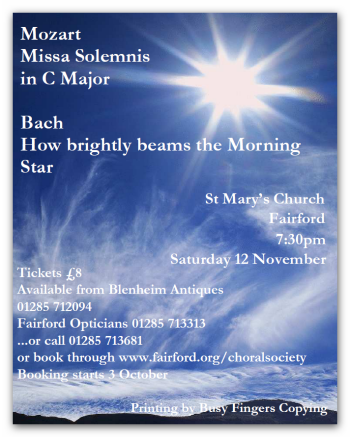
Next the Choral
Society
sang Mozart’s famous anthem Ave Verum Corpus K618.
After a few rather untidy notes at the start the choir gave us a
beautiful rendering of this lovely anthem written as a setting of a
14th century Eucharistic hymn in 1791.
This was followed
by Mozart’s
Missa Solemnis in C Major K337. John Read, the
conductor, held the choir together for some excellent singing including
the very difficult Benedictus where all parts cross each other and many
are syncopated. Four excellent soloists sang with them.
Fiona Dobie – Soprano, Natanya Phillips – Mezzo, Nicholas Pritchard –
Tenor and Henry Herford – Bass, while Fiona Brown
accompanied on the organ.
After a short
interval Fiona
Brown gave an organ solo - a chorale prelude based on
“How brightly beams the morning star” by Flor Peeters, a difficult work
played with great precision. The Choral Society returned with a work
commissioned by Durham University in 2007 on the occasion of its 175th
anniversary, “Morning Star” by Arvo Pärt.
This work involved splitting the soprano and bass lines into two parts
which was rather difficult for the basses as they were already short of
a few members through illness, but they coped well.
Finally the choir
performed the J.S. Bach cantata “Wie schön leuchtet der
Morgenstern”, again with Fiona Brown accompanying on the
organ - an exceptionally difficult part which she played superbly.
Three of the soloists returned for this work. Soprano, Tenor &
Bass. They all sang well but special note must be made of the wonderful
tenor voice of Nicholas Pritchard. The chorus parts were sung with
great precision by the choir.
Raymond
Fenton
See the Programme.
|
| Review
of the Concert on 9th April 2011 by Raymond Fenton |
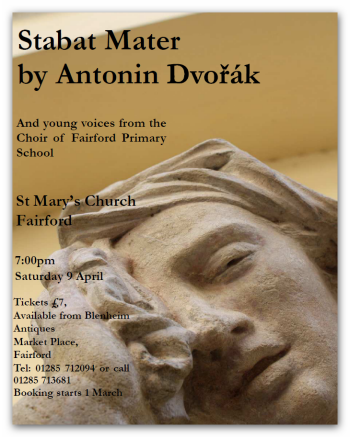
For a choral society
that
has only been in existence for four years the
performance of Dvorak’s great work Stabat Mater was an amazing feat,
especially considering that the choir only numbers a little over 40
members
Lasting well over an
hour
it is a very substantial and at times difficult work and the Fairford
& District Choral Society gave an excellent performance
together with four professional soloists. Katherine Crompton (soprano),
Sioned Ellis (mezzo soprano), Nicholas Pritchard (tenor) and Henry
Herford (bass).
Great credit must be
given
to John Read who has conducted and trained the choir since they
started, and also to some magnificent organ playing by their
accompanist Fiona Brown. We now look forward to their next concert on
Saturday 12th November.
Raymond
Fenton, 21st April 2011
|
| Review
of the Concert on 13th November 2010 by Raymond Fenton |
|
Bach’s
motet
Jesu, Priceless Treasure is the only one that has come
down to us scored for five voices. It is the longest, the most varied
and probably the most difficult. It would originally have been sung
unaccompanied but most choirs have no hesitation in doubling the parts
with the organ. Fairford & District Choral Society was only
founded three years ago, so it was a brave venture on Saturday 13th
November in St. Mary’s Church, to tackle this motet and, due I’m sure
to much hard work and supported by four Lay Clerks from Gloucester
Cathedral the performance was excellent.
The opening chorales
were
sung with confidence and accuracy. The fifth section, “Death, Death, I
do not fear” was lovely although not particularly easy, especially with
the basses semi-quaver runs. The next section, “Ye are not of the
flesh” with more semi-quaver runs coming in all five parts is
exceptionally difficult to sing and it is true to say that at times the
parts found it difficult to all keep together. The chorale in compound
time, “If therefore Christ abide in you” was particularly well sung
with very precise singing.
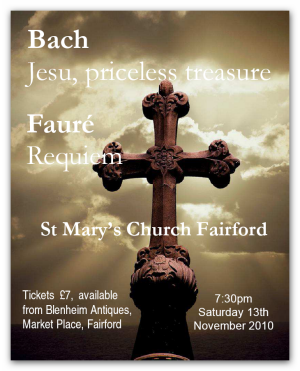
After a short
interval we
were treated to a very fine performance on the organ by
Fiona Brown who played César Frank’s Pastorale which
starts quietly and increases in volume to a middle section with some
very precise staccato playing which is then followed by a tuneful
legato passage.
Finally
the
choral society treated us to a very moving performance of Fauré’s
Requiem which is always a favourite. I was particularly
impressed by the singing of the Offertory which starts as a duet
between altos and tenors, later to be joined briefly by the basses
before the rich voice of the baritone soloist, Henry Herford takes over
before the movement is completed by all the voices. Following the
Sanctus, always a highlight we had such pleasure listening to the clear
soprano voice of Liz Gravestock singing the beautiful Pie Jesu. More
delicate singing followed with the Agnus Dei which starts off with the
tenors who were augmented by the alto section before being joined by
the full choir who made a very smooth transition from C major to Ab
major and then later back to F major before the reprieve of the opening
chorus. Another lovely baritone solo starts the Libera Me before the
full choir takes over quietly and builds to a great climax before
closing the movement with soft and delicate singing. Finally the
Requiem ends with the famous In Paradisum which is definitely not as
easy to sing as it looks, but the choir tackled it well with the whole
Requiem ending very softly back in the key of D major.
Altogether
a
wonderful evening and one that the whole choir and their conductor John
Read can be proud of.
Raymond
Fenton, 14th November 2010
|
| Review
of the Concert on 27th March 2010 by Ed Brown |
|
St Mary’s Church,
Fairford played host on Saturday night to a somewhat dichotomous
programme of sacred music. The first half, a world
premiere of “Pilgrimage”, a new work by local composer, and conductor
of Fairford and District Choral Society, John Read. The
second, Stainer’s Crucifixion, a piece
planted firmly in the 19th Century. Fairford and District Choral
society performed both admirably.
Pilgrimage,
split into eight sections, interspersed with narration, chronicles a
journey undertaken by the composer and a friend from Caen to Santiago
de Compostela in north western Spain. It was certainly effective in
conveying the sense of travel, both spatial and spiritual. There were
strong influences of folk music, and Read’s scoring had a wonderful
openness to it, sections of full choir with minimal accompaniment
contrasted with, at times, a solo flute or voice. Indeed, the music was
so effective in conveying the transitions from preparation to
wilderness to reflection, combined with the pictures projected above
the choir, that the spoken narrative in between each section of music
was barely required as an aid.
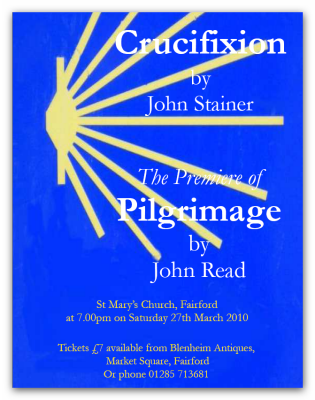
The choir performed
well;
in sections such as the 17th Century French song, they achieved the
required lightness of tone, and their tuning was impressive throughout.
The soloists stepped up to the task, holding up well in contrast to the
choir in the antiphonal sections. There could, perhaps, have been a
little more angst in the section entitled “suffering”, and a little
more malice in the “wilderness”. But, overall, this was a well drilled
performance, and it did the considerable merits of the work justice.
Stainer’s
crucifixion is a piece that can, at times, teeter on the
edge of drudgery if sufficient energy is not expended on the part of
those performing it. But for some slight flagging around the “Appeal of
the crucified”, Fairford and District Choral Society managed to keep
energy levels up, an impressive feat given that this was over an hour
of music. At times, the balance suffered slightly from the smaller
number of male voices in the ensemble, but this is not to detract from
the section’s performance. There was a suitably rambunctious sound on
“Fling wide gates”, and, again, the choir showed itself to be well
versed in dynamic contrast. Both the soloists - Peter Burrows tenor and
Derek Walker bass gave very good accounts of the work.
Evidently
well rehearsed, and effectively delivered, this was a thoroughly
enjoyable event, both for the packed audience, and, by
the looks of things, the choir. All in all, an evening of music that
both Read and the Fairford and District Choral Society can be proud of.
Ed
Brown
|
|
|
|
|
Copyright ©
Fairford
and District Choral Society 2007-2023
Registered Charity No 1118754
|
|
|
|

